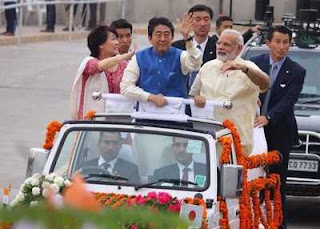Hello friends, while India and China border dispute was escalating, another major development was taking place on India's borders. Nepal, our dear neighbour had released a map claiming Kalapani, Lipulekh and Limpiyadhura as part of their territory. These areas are trijunction between India, Nepal and China (Tibet) and situated in Uttarakhand. The dispute again came under the spotlight when Nepalese foreign minister, Pradeep Kumar Gwayali visited New Delhi couple of days ago. Let's try to discuss what is the issue? What will be its impact on India - Nepal relations.
Nepal, the Himalayan Kingdom is India's unique neighbour. Two countries closely bound together with historic, civilisational, socio-cultural, economic, geostrategic and political domains. These close ties are popularly known as Roti Beti Ka Rishta. Treaty of Peace and Friendship which was signed in 1950 forms bedrock of relations.
India Nepal shares open border (no passport, no visa) between each other. As any neighbours have there have certain conflicts and uncertainties about Indo Nepalese borders. Kalapani border issue has a historic background of nearly 200 years and also, a larger context of India Nepal relations in general.
Treaty of Sugauli was signed between British and Nepalese after Anglo- Nepalese War in 1814-1816. According to this treaty, the river Kali was marked as the western border of Nepal. However, there was no consensus where the river Kali originates. And that's, why the dispute continues even today over the land consisting Limpiyadhura, Lipulekh and Kalapani, is part of India or Nepal.
Nepal claims the river which originates in the west of Kalapani near Lipulekh pass is the correct origin. Indian side views a small rivulet Pankhgad as the origin which is in eastern ridges, hence in Indian territory. Its impossible to understand this without the following map.
The issue was first raised by Nepal in 1998. It ignored the issue literally from the 1950s to 1998. The internal political atmosphere became tense in the 1990s and Kalapani came to the limelight to divert attention from internal politics. Both countries then agreed to demarcate the boundary in subsequent visits with Joint Boundary Commission.
However, any progress could not take place as internal turmoil in Nepal went on. As India published a revised map after the revocation of Article 370 in November 2019. The map showed Kalapani within Indian territory. Nepal protested and demanded foreign secretary-level talks.
The pandemic came and talks couldn't take place. However, some claim that India deliberately delayed talks which kept the issue hanging. On 8th may,2020 , Defence Minster, Rajnath Singh inaugurated Lipulekh- Dharchula pass. Nepalese protested Prime Minister KP Sharma Oli issues list of anti-India statements. One of the most controversial amongst those was "plans are being drawn out to destabilise my government by an embassy in Kathmandu." This was clear reference to India claiming that it is trying to topple Oli's government.
The constitutional amendment gets passed in Nepalese parliament showing disputed territories in Nepalese map and on flag consequently. Oli was facing fierce opposition from his rivals, especially Madhav Nepal Prachand in domestic politics. To turn domestic atmosphere hyper nationalistic, Oli created a ruckus.
Indian media started hinting China's hand in all this episode. Even the Army Chief Gen.M.M.Naravane claimed so. It's another matter where Chinese were really involved or not. However, this sent more antagonist signals in Nepal.
 |
| Aap Chronology Samjhiye!😁😁 |
The whole episode will take long time to draw curtains. It brought significant issues and trends on the forefront. India cant take Nepalese politicians as granted. India has been doing so since independence. With China challenge and appearant closeness between Nepal and China, it would be fatal mistake to take anything granted.
Nepalese politicians, royal family, common people have matrimonial ties in India. Roti Beti ka Rishta. Several decisions come as an emotional response rather than well calculated, rational moves. There are institutions created to solve and discuss issues such as Joint Boundary Commission. However, they have not proved at par. India could claim that Nepal can survive with India only because of transit routes, technology has overcome this challenge. China is planning of a highway between Afganistan, Pakistan and Nepal in high Himalayas.
The positive thing is people to people ties haven't been affected yet because of border issues Socio-cultural ties with Nepal are the strength of India. It needs to pay attention that politics and this aspect doesn't get mixed with each other.
Both sides are engaging in high-level visits after the episode. RAW chief Samant Goyal, Army Chief Gen.M.M.Naravane and Foreign Secretary Harsh V.Sringla paid visits to Nepal in last three months. Nepalese side responded by the visit of Foreign Minister, Pradeep Kumar Gyawali.
As highlighted in Gyawali's statements, what Nepal is concerned about alleged interference of India in its domestic affairs. The apparent trust deficit needs to bridged for mutual interests. Whether its border issues or anything else, India needs to be firm at the same time flexible wherever possible. Nepalese sensitivities should be considered. Debate, discussion, dialogue has been a path of solving disputes. Both sides should deal with the problems in the same way.




















